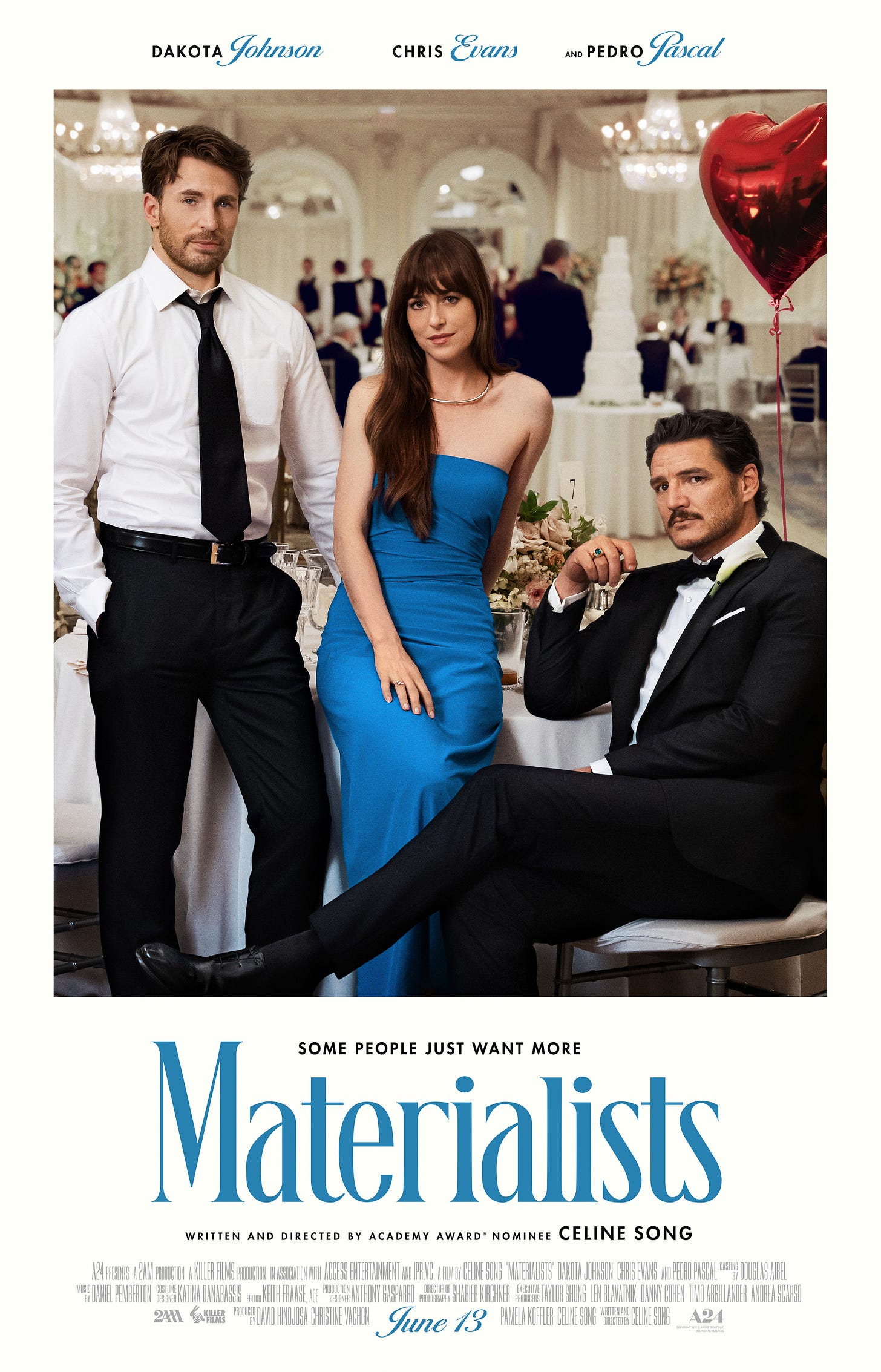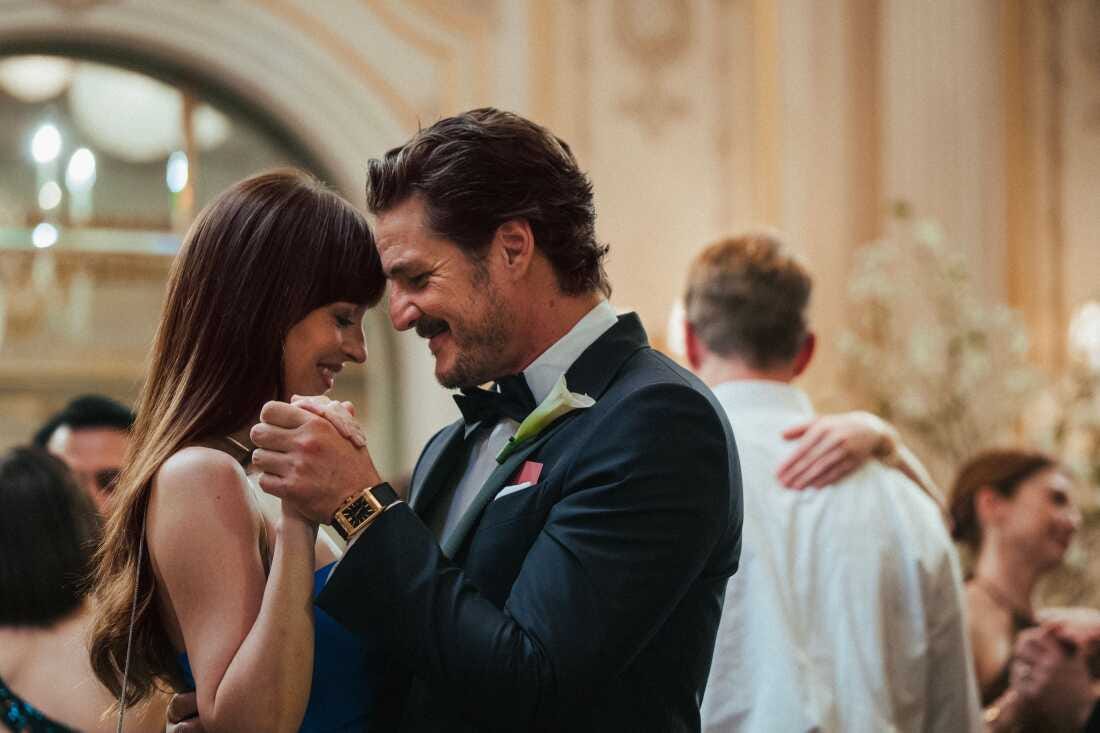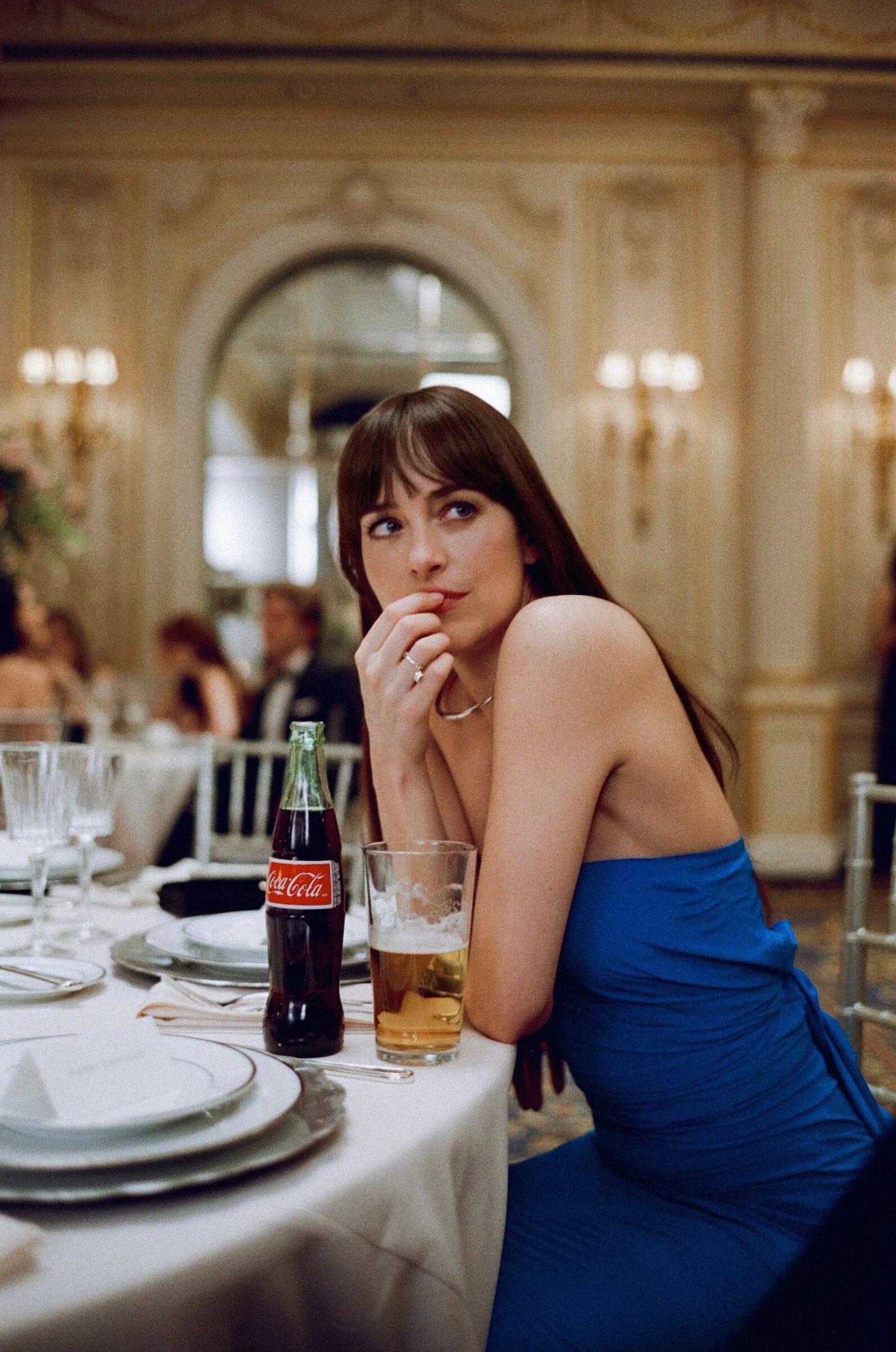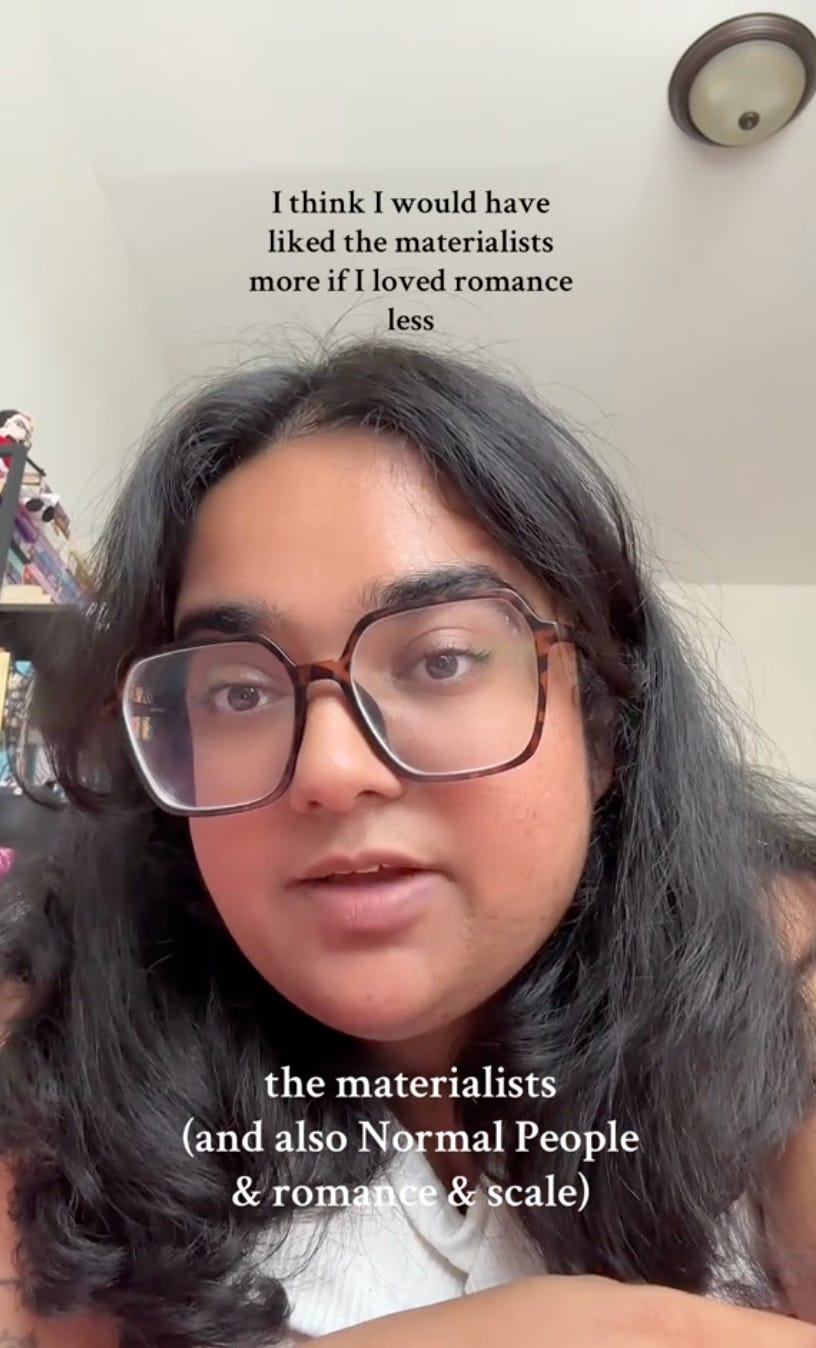why Materialists makes me sad (and it’s not about Pedro Pascal)
on modern romance, ends and means, and breaking rules that maybe shouldn't be broken
I know I’m a little late to this one by our modern metrics, but as soon as I returned from some whirlwind traveling, I knew exactly what my first Artist’s Date would be.
I assume most of my audience is familiar with the premise of the film, but if you’re not: it’s the story of a cynical, high-end matchmaker (Johnson) caught in a quasi-love triangle between a rich man she meets at the wedding of one of her clients (Pascal) and her former lover, a broke actor (Evans). Cue thematic conflict!
There are a few things I liked very much about Celine Song’s Materialists: the cast, the costumes, the cinematography. Goodness, that was a pretty film to watch—everyone is gorgeous, and the camera lingers lovingly over them (and their beautiful surroundings and wardrobes) in ways we will all deeply appreciate. There are a few totally delightful, subversive and playful scenes: namely, the one in which Pascal nearly gets down on his knees (not in the way you might expect, but iykyk), and also a pitch-perfect reenactment of that moment in every wedding where all the guests dance in the exact same way to “Sweet Caroline” (where did we all learn to do the buh-buh-buh? it must be encoded in our genes).
Unfortunately, that wasn’t enough to make me love the movie as a whole, and no one’s more disappointed about that than me. On paper, I’m the ideal audience for this movie—I’m an A24 girlie, I can quote from memory most of Dakota Johnson’s press tour (the asparaguys live in my mind rent-free), and I’m always hungry for a fresh take on modern romance. I wanted to love it.
But I did not. I typically much prefer to discuss the ways in which art WORKS for me (I love dissecting success!), but I couldn’t shake the feeling that the gap between the movie and me results from a dismissal of what I love about romance. And, well, you know when I can’t stop thinking about something, it usually turns into a newsletter.
So let’s talk about that. (Spoilers necessary ahead, sorry!)
I was moved to talk about this disconnect not just because I’m obsessed with discussing viewpoints on romance, how different creators approach it and what it means to us both individually and culturally, but also because I think it’s fascinating to trace how we make meaning of a work—and how we judge its “success.”
I firmly believe works need to be judged based on their creator’s goals: when my students critique a piece, the first question I always ask is “but what were they trying to do? Did they fail at that, or just at what you wanted it to be?” Then we can move to what “message” or “argument” they offer—what they’re trying to say about that goal. Only then can we judge how successfully they accomplish it—how convincingly and cohesively the disparate elements work toward that goal.
So when I walked out of Materialists feeling disappointed and frustrated, I made myself take my own medicine. Was I just upset because I wanted it to be a clearer genre romance? Was I measuring it with the right ruler?
From the very beginning of the film, the thematic question is clear: is love something ineffable and intangible, or does a “good match” boil down to math (as Johnson says, “similar attractiveness, upbringings, political beliefs, and wealth”)?
It’s not a subtle theme. We get lines like “she’s not competitive in the mainstream market,” or “it’s worth surgery to double your value”—and, in an interesting pseudo-Save the Cat moment, Johnson tells her client—about to be married, getting some cold feet—that “marriage is a business deal you can walk away from.” Cynical, yes, but it positions her as a matchmaker who at least still centers her clients’ agency.
Based on Song’s previous work in Past Lives, which is bittersweet and intentionally subverts the happy ending we expect from romance (along with the branding of the movie, which is explicitly not as a romcom!), I genuinely expected Johnson’s character Lucy to end up with Pedro Pascal, our handsome rich daddy. I expected to see her wavering, considering other paths toward life and love—but ultimately recommitting to her worldview where material comfort does affect one’s happiness. A little anti-romance, sure, but still a perspective I would’ve been interested to explore deeply.
I’m not sure that version would have made me any happier, but I definitely was not satisfied by the ending where she ends up with broke actor and former flame Chris Evans.
Not because I didn’t want the happy ending. (I generally prefer the happy ending!)
But because we didn’t earn it—and that felt anti-romance, too. And because of the mismatch between the ending and the journey toward it, I was left deeply confused about how to judge this movie’s success—was it really a romance, or something more cynical?
Let me break that down a little more.
First, the mismatch between ending and journey. If you’re going to give me a romance ending, I think the best way to earn it is with romance techniques. And chief among those is a rich, intimate exploration of character.
I know very little about Johnson and Evans’s characters: they both had “messed up families” (we receive no detail other than the fact that Johnson’s parents argued over money), they once fought over an anniversary dinner they were running late to because Evans wouldn’t pay for a parking lot in Manhattan, and Evans remembers that Lucy’s favorite drink is Coke and beer.
We’re held at a distance from these characters as both individuals and as a couple; while I think the best dialogue in any piece has thematic resonance beyond what’s happening for characters or plot (and, of course, all of these should be interwoven seamlessly), the dialogue in Materialists reads as thesis alone. They discuss what love is, and what soulmates are, and what role money plays in their lives right now, but their perspectives don’t feel particularly grounded in their specific experiences—they’re provocative, sometimes interesting statements, but they could be spoken by just about anyone in that same class.
So, is the movie trying to question the romanticized view of love that’s all about personality and compatibility? If it eschews the backbone of most romance plots—convincing each other and the audience that these characters have something unique and meaningful to offer their other half—perhaps it’s making an argument that Johnson’s initial worldview is accurate, and the most lasting happiness comes from cold, hard facts on paper?
But no. When one of Johnson’s clients gets sexually assaulted by a man she set her up with, the plot turns. Johnson’s belief in her job is shaken, she calls Evans for comfort, and distance grows between her and Pascal. She realizes she doesn’t really know him—doesn’t know any of the men who look so good on paper. So, like, love does have to be about who a person is?!
The scene where Johnson calls Evans is one of the most convincing in the film. When he rapidly exits a bodega and sits on the curb to talk to her, asking if he can come over to help when he hears the distress in her voice, she reveals that she’s headed to Pascal’s place—a very clear “I may be committed to him right now, but you’re the one I come to when I really need support.” That’s an action that carries a lot of weight, and a really illuminating moment in the story of their love triangle.
Unfortunately, I still don’t know why. Because I barely see them interact, I don’t know how each helps the other grow, and I’m unclear what they teach each other. In Evans’s final monologue, he says Johnson inspires him to be brave (to pick up more shifts and get a real manager?), but we haven’t seen these challenges onscreen. I had no idea he didn’t have a manager, wasn’t already working his butt off. And though Johnson ultimately (considers) quitting her matchmaking job in the final sequence, I didn’t get the sense this was because of Evans’s influence, but rather something that was already in motion thanks to her botched set-up and resulting friendship with her client.
Romance is satisfying because we know the individuals well enough to know they’re right for each other. A theme pays off because, as Mernit would say (see my last newsletter), we understand why these people must learn this lesson at this moment.
Without that scaffolding, even a happy ending leaves me cold.
So, again: is it a romance, or something more cynical?
I still think this movie is closer to a romance than anything else. Early in the film, Johnson says “dating is hard, but love is easy”—and in the end, she returns to this refrain. The reason Johnson and Evans end up together is because they can’t help loving each other—because their love is something ineffable.
There’s an interesting counterpoint to this in something Pascal says in one of my favorite scenes between him and Johnson. On an early date, when she’s protesting that he’s way out of her league, he says her “intangibles” (e.g. not money or age or beauty) make her a perfect match—the way she sees the world clearly, her wit, etc. But of course, being seen and valued in those ways ultimately isn’t enough for her either.
That leads me to the most accurate final theme I could develop: that love can’t be boiled down to something you can name, be that tangible or intangible. Unfortunately, if that’s the film’s ultimate argument, I think it will always be unsatisfying—because how, then, can you show us this is true?
Besides, I (like the film’s tagline) couldn’t help craving a little more than that in today’s world, with its modern gender roles and economic crises and endless choices and epidemics of loneliness. All things the film was perfectly positioned to grapple with in fresh, exciting ways—and perhaps because of this rich set-up, I was left longing for a more compelling explanation for why a Dakota/Evans love is still worth it today.
But maybe I’m wrong, and the film’s not making an argument about love, but rather one about capitalism? Is it successful at that?
made a brilliant TikTok on this that I think everyone should watch, and she makes the great point that romance as a genre works so well because it uses the specific and individual to illuminate the universal. When she brought up Normal People by Sally Rooney as a counterpoint to Materialists, I cheered—because yes, that story does a beautiful job of examining how class intersects with love, and develops its ideas with such power because of the specificity of character.Perhaps if I’d known more about Johnson and Evans’s characters, I would have experienced the thematic conflict more persuasively. If the movie’s goal isn’t to make an argument about love, but rather one about class—if it simply doesn’t care about these characters as individuals, but merely as examples of bigger societal patterns and problems—then I can’t help agreeing with Sanjana that it could have made that case more persuasively by also caring about them more deeply as people.
Perhaps then it wouldn’t only be more satisfying as a romance, but also more satisfying as a thesis. It’s hard to be persuaded by the argument that love is, indeed, about more than money and numbers if I never quite see what else it’s about.
After all, the great beauty of a love triangle is that it sets up two different versions of life, of a protagonist’s identity. At the end of this film, we know Johnson is turning away from the surface of wealth and ease that Pascal represents—I just don’t know what exactly she’s turning toward.
Here’s where I start projecting, so please read this part knowing it’s more about me than about Song. But (Carrie Bradshaw voice) I can’t help wondering if this film would have been much more successful had it been allowed to grow into a no-holds-barred romance.
That’s where I get sad. Because if I’m right, and the intended theme was about the beauty and power of love against all logic, why were the necessary tools left on the table?
Is it because we disparage the satisfaction of a convincing romance? Because “high art” undervalues the beats and techniques of this genre? Because we think they’re so easy to pull off, and thus skirt them in favor of something “edgier”?
I think there’s no more meaningful theme than what it means to be known to someone, to connect with vulnerability and bravery and to expand our lives as a result. I think it’s really damn hard to write a romance with three-dimensional characters who make you shout and cry and clutch your heart and kick your feet.
And some of my favorite works are the ones that deeply respect this challenge—who swing for the fences with open hearts.
As Sanjana said, “I might have liked Materialists more if I loved romance less.”
If you watched it and have anything to add—even if you disagree with me! I would love to hear what everyone is enjoying and appreciating about this movie!—please let me know?
In the meantime… I think I’m going to go catch up on Love Island.
Much love always,
🤍 Emily












You’ve beautifully captured everything I couldn’t see to put into words. Bravo 👏🏽👏🏽👏🏽
This movie was so different than what I was expecting. One that made me think far more than feel, which I was shocked by after Past Lives. In that case, I found it sort of interesting if that was the intention. But overall I wanted to feel much more. That being said it’s a beautifully shot film, and I am interested in seeing it again!